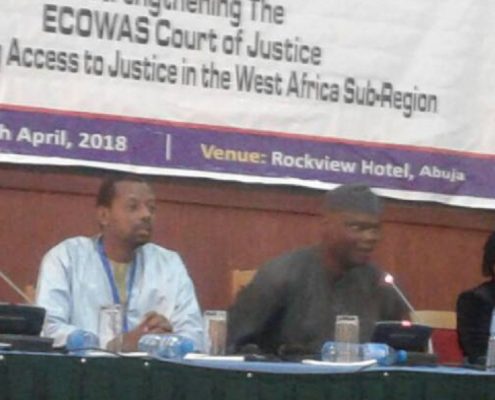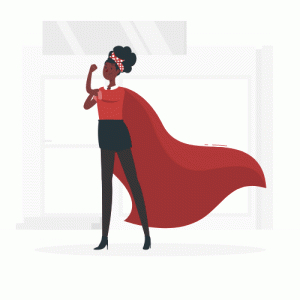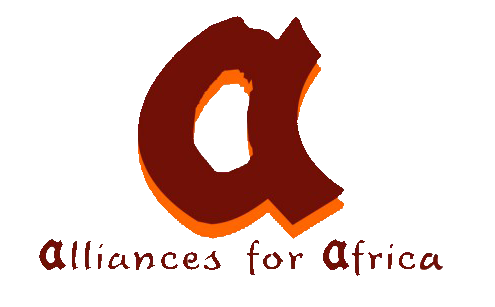Alliances for Africa remains active in networking and building coalitions with civil society organizations in order to enhance and strengthen local, national, sub-regional and international institutions in Africa with the objective of monitoring, advancing, promoting and protection of human rights. Alliances for Africa had participated in the two day workshop on strengthening the ECOWAS court of justice and enhancing access to justice in the West African region.
The President of the ECOWAS Court of Justice, Hon Justice Traore Jerome stated that there is need to strengthen the ECOWAS Court of Justice to advance democracy and the rule of law. He narrated the obvious challenges faced by the Court stating that the Court needs:
- Adequate staffing particularly lawyers that have knowledge of the human right cases before it.
- An adequate court complex to enable it carry out its mandate and ensure that citizens benefit from the activities of the court.
- Establishment of an appellate chamber for the Court.
- Establishment of Legal Aid Fund to facilitate access to justice for victims of human rights abuses that cannot afford legal representation. He concluded with saying that he hopes the participants make strong recommendations that will strengthen the Court as the pride of the sub-region.

Erudite lawyer and human rights activist, Femi Falana (SAN) in his keynote speech on Deploying the ECOWAS Legal Architecture for Addressing Impunity in West Africa sub-region gave a historical background into the establishment of the ECOWAS Court of Justice, he enumerated some laudable achievements of the Court in the areas of fair hearing, free speech, right to life, personal liberty, political association, etc. In addition, he reviewed some of the decided cases of the Court including the landmark case of Dorothy Njamanze & 3 ors v the FRN.
He urged the Court to expand its ambit to focus on socio-economic rights so that it won’t deny community citizens of the dividends of democracy including human rights.
HIGHLIGHTS
The highlights of the sessions include:
- That the Court has done remarkably well from its records.
- That the proposed reduction in the number of judges should be reviewed and that more judges should be appointed to enable efficient and effective dispensation of justice.
- That the mandate of the Court needs to be defended and the capacity of the Court strengthened.
- Also presentations were made by Eric Bizimana of Institute of Human Rights and Development in Africa, and Ms Chetachi Udeh of Alliances for Africa, both of who gave perspective as users of the court.
- Access to the ECOWAS Court is hinged on principles of non-anonymity and non-institution of matters in any other international tribunal or Court.
- The absence of the complimentarily principle in that the Court does not require the exhaustion of local remedies before an action is brought before it.
- That the statute of limitation has been removed in human right enforcement cases in the recently delivered judgment of Federation of African Journalists v Republic of Gambia.
- A Non Governmental Organization cannot maintain an action as the plaintiff before the Court whereas it can institute actions on behalf of victims of human right violations.
- Individuals and corporate bodies have direct access to judicial bodies like ECOWAS Court.
Ms Chetachi Udeh, a Legal Program Officer at Alliances for Africa shared Alliances for Africa’s experience with the court through the litigation of the case of Njamanze & 3 Others v Nigeria. She stated key challenges to include communication difficulties with the court, limitation of number of pages to file in a case document, difficulties in filing cases as a result of no electronic filing system, the distance of the court from where the victims are based, as result of which there is high cost of accessing the court, the adjournment of cases at short notice, non-implementation of court’s decision, which she called on CSOs to prioritize as an advocacy issue. She further stated that the judgment in the above case is remarkable because it set the precedent on gender based discrimination and violence relying on the Protocol to the African Charter on Human and People’s Rights on the Rights of Women in Africa (Maputo Protocol).
CONCLUSION:
It was a unanimously agreed by the participants that:
- The proposal/decision to reduce the number of judges of the Court from 7 to 5 is purely a political one that has no legal force.
- There exist low level of co-operation between member states and the Court given that only 4 states out of the 15 member states (and recently, the Niger Republic) have established bodies to follow up on enforcement of the decisions of the Court as stipulated in the 2005 Supplementary Protocol of the ECOWAS
- CSOs can advocate for appellate chambers of the Court to be established as the court does not have appellate powers and cannot interfere with the national jurisdiction of member states.
- There has been no study to assess the need to confer criminal jurisdiction on the Court save for the proposal received from member states.
- NGOs can approach the Court to seek redress on behalf of victims of human right violations in the member states.
- States should appoint bodies/committees that will follow up on decisions of the Court to enforce implementation.
- That the rule of evidence on certification is applied by the Court and that Article 24 of the Protocol states that the decisions of the Court will be implemented through the Civil Procedure Rules of the member states.
- That there is a need to be brief and concise in making written applications and that notice of adjournment should be given to litigants early enough to save time and resources.
- That the rules of the Court provide for electronic lodging of complaints and submission of applications by litigants provided that the hard copies are transmitted within 10 days and that there is a need to update the rules of the Court on filings to accommodate effective electronic filings.
- That supports rendered by CSOs to facilitate access to justice in the Court for instance in translation of proceedings and judgments should be welcomed.
- That the capacity of lawyers needs to be built to ensure that they can approach the court and seek redress for victims of rights violations.

